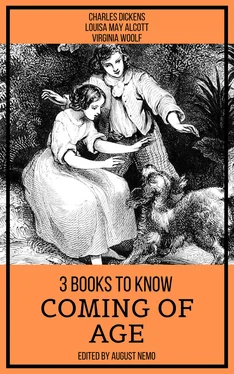I had not got as much further down the street as the post-office, when I again beheld Trabb's boy shooting round by a back way. This time, he was entirely changed. He wore the blue bag in the manner of my great-coat, and was strutting along the pavement towards me on the opposite side of the street, attended by a company of delighted young friends to whom he from time to time exclaimed, with a wave of his hand, "Don't know yah!" Words cannot state the amount of aggravation and injury wreaked upon me by Trabb's boy, when, passing abreast of me, he pulled up his shirt-collar, twined his side-hair, stuck an arm akimbo, and smirked extravagantly by, wriggling his elbows and body, and drawling to his attendants, "Don't know yah, don't know yah, pon my soul don't know yah!" The disgrace attendant on his immediately afterwards taking to crowing and pursuing me across the bridge with crows, as from an exceedingly dejected fowl who had known me when I was a blacksmith, culminated the disgrace with which I left the town, and was, so to speak, ejected by it into the open country.
But unless I had taken the life of Trabb's boy on that occasion, I really do not even now see what I could have done save endure. To have struggled with him in the street, or to have exacted any lower recompense from him than his heart's best blood, would have been futile and degrading. Moreover, he was a boy whom no man could hurt; an invulnerable and dodging serpent who, when chased into a corner, flew out again between his captor's legs, scornfully yelping. I wrote, however, to Mr. Trabb by next day's post, to say that Mr. Pip must decline to deal further with one who could so far forget what he owed to the best interests of society, as to employ a boy who excited Loathing in every respectable mind.
The coach, with Mr. Jaggers inside, came up in due time, and I took my box-seat again, and arrived in London safe—but not sound, for my heart was gone. As soon as I arrived, I sent a penitential codfish and barrel of oysters to Joe (as reparation for not having gone myself), and then went on to Barnard's Inn.
I found Herbert dining on cold meat, and delighted to welcome me back. Having despatched The Avenger to the coffee-house for an addition to the dinner, I felt that I must open my breast that very evening to my friend and chum. As confidence was out of the question with The Avenger in the hall, which could merely be regarded in the light of an ante-chamber to the keyhole, I sent him to the Play. A better proof of the severity of my bondage to that taskmaster could scarcely be afforded, than the degrading shifts to which I was constantly driven to find him employment. So mean is extremity, that I sometimes sent him to Hyde Park Corner to see what o'clock it was.
Dinner done and we sitting with our feet upon the fender, I said to Herbert, "My dear Herbert, I have something very particular to tell you."
"My dear Handel," he returned, "I shall esteem and respect your confidence."
"It concerns myself, Herbert," said I, "and one other person."
Herbert crossed his feet, looked at the fire with his head on one side, and having looked at it in vain for some time, looked at me because I didn't go on.
"Herbert," said I, laying my hand upon his knee, "I love—I adore—Estella."
Instead of being transfixed, Herbert replied in an easy matter-of-course way, "Exactly. Well?"
"Well, Herbert? Is that all you say? Well?"
"What next, I mean?" said Herbert. "Of course I know that."
"How do you know it?" said I.
"How do I know it, Handel? Why, from you."
"I never told you."
"Told me! You have never told me when you have got your hair cut, but I have had senses to perceive it. You have always adored her, ever since I have known you. You brought your adoration and your portmanteau here, together. Told me! Why, you have always told me all day long. When you told me your own story, you told me plainly that you began adoring her the first time you saw her, when you were very young indeed."
"Very well, then," said I, to whom this was a new and not unwelcome light, "I have never left off adoring her. And she has come back, a most beautiful and most elegant creature. And I saw her yesterday. And if I adored her before, I now doubly adore her."
"Lucky for you then, Handel," said Herbert, "that you are picked out for her and allotted to her. Without encroaching on forbidden ground, we may venture to say that there can be no doubt between ourselves of that fact. Have you any idea yet, of Estella's views on the adoration question?"
I shook my head gloomily. "Oh! She is thousands of miles away, from me," said I.
"Patience, my dear Handel: time enough, time enough. But you have something more to say?"
"I am ashamed to say it," I returned, "and yet it's no worse to say it than to think it. You call me a lucky fellow. Of course, I am. I was a blacksmith's boy but yesterday; I am—what shall I say I am—to-day?"
"Say, a good fellow, if you want a phrase," returned Herbert, smiling, and clapping his hand on the back of mine, "a good fellow, with impetuosity and hesitation, boldness and diffidence, action and dreaming, curiously mixed in him."
I stopped for a moment to consider whether there really was this mixture in my character. On the whole, I by no means recognized the analysis, but thought it not worth disputing.
"When I ask what I am to call myself to-day, Herbert," I went on, "I suggest what I have in my thoughts. You say I am lucky. I know I have done nothing to raise myself in life, and that Fortune alone has raised me; that is being very lucky. And yet, when I think of Estella—"
("And when don't you, you know?" Herbert threw in, with his eyes on the fire; which I thought kind and sympathetic of him.)
"—Then, my dear Herbert, I cannot tell you how dependent and uncertain I feel, and how exposed to hundreds of chances. Avoiding forbidden ground, as you did just now, I may still say that on the constancy of one person (naming no person) all my expectations depend. And at the best, how indefinite and unsatisfactory, only to know so vaguely what they are!" In saying this, I relieved my mind of what had always been there, more or less, though no doubt most since yesterday.
"Now, Handel," Herbert replied, in his gay hopeful way, "it seems to me that in the despondency of the tender passion, we are looking into our gift-horse's mouth with a magnifying-glass. Likewise, it seems to me that, concentrating our attention on the examination, we altogether overlook one of the best points of the animal. Didn't you tell me that your guardian, Mr. Jaggers, told you in the beginning, that you were not endowed with expectations only? And even if he had not told you so—though that is a very large If, I grant—could you believe that of all men in London, Mr. Jaggers is the man to hold his present relations towards you unless he were sure of his ground?"
I said I could not deny that this was a strong point. I said it (people often do so, in such cases) like a rather reluctant concession to truth and justice;—as if I wanted to deny it!
"I should think it was a strong point," said Herbert, "and I should think you would be puzzled to imagine a stronger; as to the rest, you must bide your guardian's time, and he must bide his client's time. You'll be one-and-twenty before you know where you are, and then perhaps you'll get some further enlightenment. At all events, you'll be nearer getting it, for it must come at last."
"What a hopeful disposition you have!" said I, gratefully admiring his cheery ways.
"I ought to have," said Herbert, "for I have not much else. I must acknowledge, by-the-bye, that the good sense of what I have just said is not my own, but my father's. The only remark I ever heard him make on your story, was the final one: "The thing is settled and done, or Mr. Jaggers would not be in it." And now before I say anything more about my father, or my father's son, and repay confidence with confidence, I want to make myself seriously disagreeable to you for a moment—positively repulsive."
Читать дальше












